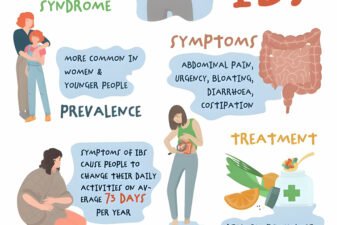IBS Symptoms
Irritable bowel syndrome (IBS) is an intestinal disorder whose symptoms typically include: bloating, gas, abdominal cramps and changes in bowel habits. In practice, most sufferers suffer mainly either from diarrhea, or constipation, although both symptoms are usually experienced to some degree.
IBS Causes
IBS is sometimes referred to as: colitis, spastic colon or spastic bowel. In fact, IBS is a functional disorder because there is no organic cause or sign of disease when the colon is examined. Current medical opinion suggests that emotional conflict or stress are the main triggers for irritable bowel syndrome, while bowel sensitivity, hormones, bacteria balance, neuromuscular connective problems between the brain and gastrointesinal tract and food insensitivity may all play a part in the incidence and severity of symptoms.
IBS Health Consequences
Irritable bowel syndrome can cause great discomfort, but it is not believed to lead to serious or permanent harm to the intestines. IBS has not been shown to lead to serious, organic diseases like cancer, nor has a link been established between IBS and inflammatory bowel diseases such as Crohn’s disease or ulcerative colitis.
IBS Treatment
Treatment for irritable bowel syndrome is typically conditional upon a patient’s age, general health and medical history, severity of symptoms, tolerance and suitability for medications. Treatment may include diet modification, such as switching to a high fiber diet, the use of fiber supplements, laxatives, antispasmodic medications, tranquilizers, or anti-depressants to relieve symptoms.
Role of Stress in Irritable Bowel Syndrome
Stress stimulates colonic spasm in people with IBS, because (experts believe) the colon is partly controlled by the nervous system. Stress counseling and tension reducing techniques can help relieve the symptoms of IBS. But this does not mean IBS is the result of a ‘personality disorder’.
Diagnosing Irritable Bowel Syndrome
Because symptoms of IBS are also consistent with other diseases, doctors typically seek a complete medical history, perform a physical examination, and institute lab tests for infection and inflammation. These tests and procedures may include: (1) Blood tests, to check for anemia, infection, or illness caused by inflammation or irritation; (2) Urine analysis and culture tests, to check for urinary tract infections; (3) Stool culture tests, to check for the presence of abnormal bacteria in the digestive tract; (4) Fecal blood test, to check for hidden blood in the stool which may indicate an inflammatory source in the gastrointestinal tract; (5) Abdominal x-rays; (6) Abdominal ultrasound test, to check internal organs and assess blood flow; (7) Esophagogastroduodenoscopy (EGD), a procedure to examine the inside of the esophagus, stomach, and duodenum for abnormal growths, using a thin tube, called an endoscope; (8) Colonoscopy, (using another tube!) to check the entire length of the large intestine to identify abnormal growths, inflamed tissue, ulcers, and bleeding.










